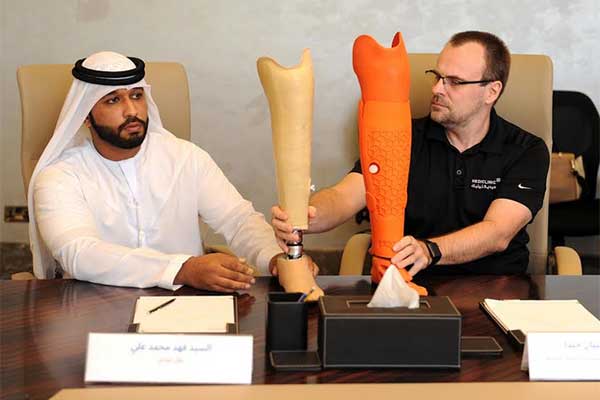
Emirati double amputee gets 3D printed prosthetics
DUBAI, June 13, 2018
Under the patronage of Dubai Health Authority (DHA) and in partnership with Mediclinic, Mercuris and Immensa Technology Labs, an Emirati double amputee recently became the first to receive 3D printed transtibial prosthetics.
The department of humanitarian services at the DHA fully supported and funded the initiative.
The 25-year-old year old Emirati a Paralympic champion was able to walk with the maximum feeling of anatomical function due to his 3D prosthetics.
Humaid Al Qutami, director-general of the Dubai Health Authority, said: “The DHA has prioritised fostering the development of future technologies such as 3D printing in healthcare to provide high-quality patient-centric care. We are keen to use this technology in the health sector to improve efficiencies, enhance healthcare management, improve overall workflows and most importantly further improve patient care. This is truly heartening as it is an example of how healthcare technology directly improves the patient’s quality of life. We aim to continue harnessing manpower, collaborating and investing in future health technologies to serve our community.”
Dr Mohammad Al Redha, the Director of the Executive Office for Organisational Transformation at DHA, said, “This is a unique collaboration that allows us to see the most modern technology develop and become a reality. Our aim at the DHA is to provide patients with the best possible care and thus we are happy to bring together international and local stakeholders to work jointly on future technologies. The work we have done so far is part of the foundation of future 3D printing research and development work in the UAE.
Sebastian Giede, certified orthopaedic prosthetist with Mediclinic, said, “The potential of 3D printing in the field of prosthetic devices is huge. It allows for faster turnaround times, we can get a foot customized within two to three weeks, it provides more personalisation in terms of both design and functionality, as well as great flexibility when it comes to replacement. The functionality of 3D printed prosthetics is superior as it allows us to design completely individualised models as compared to mass manufactured prosthetics.”
Giede added that every aspect including the colour can be individualised.
In terms of the process of designing the 3D prosthetics, Giede, said, “We conducted several 3D scans of the patient’s amputated legs. After that, we used a CAD software program to design and modify the inner shape of the prosthesis. Then the test socket was 3D printed so that we could use it on the patient to control the size and make changes that will help provide the patient with maximum comfort and functional alignment.”
A Dubai-based company known as Immensa Technology Labs provided the test socket and final socket, which is about 40 per cent of the 3D prosthetics.
Fahmi Al Shawwa, CEO of Immensa Technology Labs, said, “3D printing technology provides a massive opportunity for Dubai to become competitive across various sectors including medical and we are proud to be working with the DHA and Sebastian Giede to realise this potential. Immensa is investing heavily in developing 3D printing capabilities and knowledge in line with the ‘Dubai 3D Printing Strategy’ and we believe that we need to see more private sector participation and involvement to fully capitalise on this technology on a wider UAE scale.”
The rest of the 3D prosthetics were provided by Mecuris, which is a company based in Germany that combines existing industrial 3D technologies like 3D scanning, 3D data processing and 3D printing into an innovative process of digital tailoring for orthopaedics.
Manuel Opitz, CEO of Mecuris GmbH Germany said: “We team up with medical professionals to co-create - with users and wearers - customised O&P products. This now is the second time we have worked together. With partners like this, boundaries are non-existent and the patient’s needs and preferences are at the centre of a truly individual care, enabling us to enrich the wearer´s life.”
Giede constructed the prosthetics in Dubai, he said, “We are proud that we were able to provide Fahad with 100 per cent customized 3D printed prosthetics that provides a natural feeling of anatomical movement to the maximum extent possible.” – TradeArabia News Service







